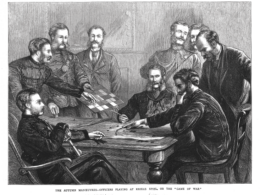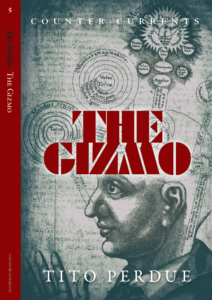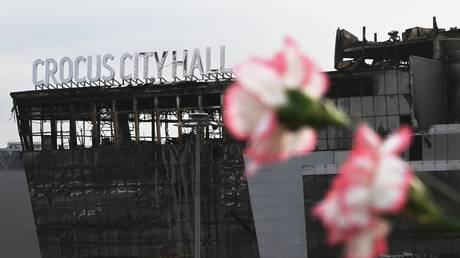On Second World War Fetishism

Joseph Nash, The Autumn Manoeuvres, Officers Playing at Kriegs Spiel, or the “Game of War” (1872) (Courtesy of Wikipedia)
1,349 words
In my last essay, and against my better judgement, I quoted from memory something that Winston Churchill might or might not have said. I could be wrong; people attribute all sorts of things to Churchill that he never said. This, of course, launched a discussion about the Second World War in the comments.
You would be surprised — or perhaps not — how often the subject of the Second World War comes up in the comments sections of essays I’ve written that have nothing to do with the war. Once in a blue moon, one of my articles will get reprinted over at The Unz Review. When that happens, I appreciate being published in the same publication with Steve Sailer and John Derbyshire, but the best part is that the comments section is usually quite lively. Sometimes they like me, sometimes they don’t. Sometimes they are even brutal and seem to hate me for no reason. But it’s always interesting.
The last time I was published at Unz, I was eager with anticipation at the response I’d get, but the entire comments section ended up being people discussing the Second World War. No one has been discussing the actual content of my piece. The pattern is always the same: Someone brings up the war, another responds to it, and then the whole comments section ends up being a discussion of the war.
There are two things that I believe it is unhealthy to spend too much time thinking about: the Second World War and the ethnostate. Far too much mental energy is spent dwelling on the past and speculating about the far-off future. Yes, there is value in knowing how we got here and knowing where you want to go, but first and foremost, an activist must live in the here and now. Revolutionary politics requires some degree of improvisation. Things will happen that will cause one to rethink strategy. Opportunities will arise in unexpected places, and one should be alert to emerging trends. Relitigating the Second World War takes people out of the here and now.
Better than knowing where you want to go is thinking about how you get to the next step. Yes, we all want our own white communities. What’s the first step toward getting there? Being in the here and now means thinking in terms of short-term goals. What’s the next step up the ladder? Elon Musk has given us a free-speech tool. What can we do with it? How do we turn anti-Zionists into White Nationalists? White Nationalists compete with several other movements for an audience — the Bronze Age Pervert sphere, the post-Left, the manosphere, etc. How do we reach these people? How do we address their talking points? These are far more important questions to be asking than where Hitler went wrong.
The Second World War is a fascinating subject, but I think people put entirely too much emphasis on it. In my opinion, The Great War of 1914-1918 was a far more devastating one because it broke the European spirit. The decades leading up to the First World War were an era of optimism and romanticism. Mankind was learning to fly, and for the first time people could send a telegram to the other side of the world. It was the golden age of speculative fiction. But the Great War and the Spanish Flu were so emotionally and psychologically traumatic for the European people that something inside them died. Cynicism and self-doubt crept in; their art got uglier and their literature got darker. The previous spirit of optimism lived on in the United States — at least through the twentieth century. Before the Iraq War, people thought America could do anything. This not to mention that the First World War broke the European aristocracy, which had historically been an obstacle to Jewish advancement.
Broke: Wishing Hitler had won
Woke: Wishing the Second World War could have been avoided.
Bespoke: Understanding that by the time the war came around, the damage had already been done.

You can buy Tito Perdue’s The Gizmo here.
Many moons ago, I went to the Père Lachaise Cemetery in Paris to see the grave of Oscar Wilde. Yeah, I saw Jim Morrison’s stupid grave while was there, too, but I was there to see Wilde. I also walked into the section containing the First World War dead and found the experience quite moving. It was raining at the time, which added to the dramatic effect. It occurred to me how little I knew of the conflict. Americans are famous for knowing very little about the First World war, even though more British, French, and Italians died in that war than in the Second.
The reason is that the Great War is not as sexy as the Second World War. The latter has an interesting cast of characters, clear-cut good guys and bad guys, dramatic turning points, and cool aesthetics. The Great War has none of these. There were some battles that lasted for month, but where no territory changed hands, including the five battles of Ypres, 12 battles of Isonzo, and a couple each in the Marne and the Somme. No one can even definitively answer what that war was about. The whole thing presents itself as a riddle, which is what makes it a far more interesting conflict.
One thing Nazi fetishists do — due primarily to their lack of knowledge of about the First World War — is unquestioningly accept the Nazi narratives about it. “The Germans were outraged that they were made to accept guilt for the war.” Yeah, because the truth hurts. Do you know the events of the July crisis? Strictly speaking, you could say that Russia started the war, but Germany made it a far bigger conflict than it needed to be.
The Great War could have only ended up as a regional war, with Russia and Serbia on one side and Germany and Austria on the other, and it would have been over within a year. But Germany had only one battle plan, which assumed there would be a two-front war between France and Russia. Germany made no plans for what to do if only one side mobilized against them — which is what happened. As such, when Germany decided to go to war with Russia, France was going to war whether she liked it or not, and there was nothing she could have done to prevent it. France was the only one of the Great Powers to enter the war involuntarily. Thus, from their perspective, yes, Germany absolutely started the war.
Then there are the dumb talking points about how harsh the Treaty of Versailles was. Given that Germany was indeed able to rise up and invade France again, it clearly was not harsh enough. Since they weren’t able to prevent that, it was a lousy treaty for the victors. France wanted to annex the Rhineland but were talked out of it by a promise of an American defensive pact which never materialized. They should have held firm on the Rhineland. Germany had recently launched a completely unprovoked attack on them that destroyed a third of their industry and wiped out a generation of their youth. I think the Rhineland was a more than reasonable request.
What is undeniable is that the First World War produced more great artists. Many of the great interwar actors, novelists, directors, and playwrights served in that war: Ernst Hemmingway, W. Somerset Maugham, William Wellman. The Second World War does not have the same reputation for having produced great artists for some reason. It’s as if everyone who fought in that war returned home and became a normie. Maybe they wrote some adventure novels, but not the deep philosophical treatises about war such as A Farewell to Arms or All Quiet of the Western Front. The Great War also produced war poets. Did anyone who fought in it write poetry about the Second World War?
Moreover, would those who are heavily into the Second World War read it even if there were?



